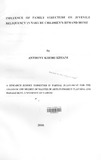| dc.description.abstract | A UNICEF report (2006) says the global number of children deprived of liberty as a result of conflict with the law is estimated to be not less than one million. The root social causes that bring children into conflict with the law include poverty, broken homes, and lack of education and employment opportunities, migration, drug or substance misuse, peer pressure, lack of parental guidance, violence, abuse and exploitation. The purpose of this study in this connection sought to investigate the influence of family unit structure on juvenile delinquency at Nakuru Children's Remand Horne.
The specific objectives of the study was to study the relationship between Juvenile delinquency and intact family structure, a single parent family structure unother only/father only), a family structure with a step parent, a child brought in a children horne and for children brought up by grandparents. The research adopted an expost facto design. In order to collect the required data the population of the study comprised an analysis of Secondary data from the records on Children whose cases have been concluded by the Children Court and the use of a questionnaire that guided a structured interview for child offenders admitted at NCRH.The expected sample size was 60. The questionnaire was piloted in a similar 60. piloted in a similar children home at the Nakuru Probation Hostel.
The collected data was coded and analyzed using descriptive and namely; frequency tables and correlations respectively. Frequency and Pearson Correlation tables were used to present the findings of the study. The statical Package for Social Sciences (SPSS) for Windows version 12 was used in data analysis. The findings for this research found that there was a strong correlation between murder and a child having come from an intact family but there was a weak correlation between substance abuse and children from an intact family. For a single parent family parenthood, there was a strong correlation between street life, sex and defilement offences.
Children brought up in a step parent home had a strong inclination towards substance abuse but the correlation was even greater for stealing and refusing school. For children having come from a children's home, they had a strong correlation towards substance abuse and street life but showed a negative strong correlation with refusing school. For children brought up in a grandparent family structure, the correlation was strong for substance abuse and the highest for stealing. Murder was the least committed offence while refusing school and street life were the most dominant. This research concludes that single parenthood families were the most significant for all offences in the study except murder. | en_US |

